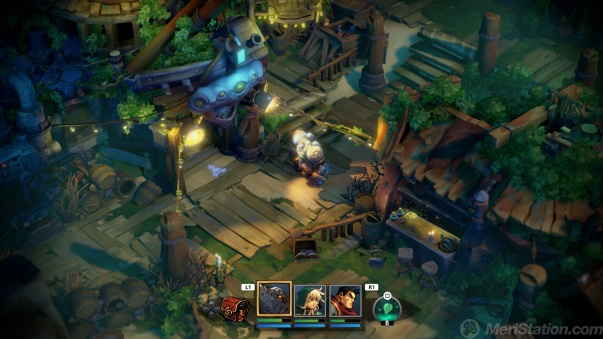Reviewing the analysis done in his day with Original Sin , you can find many of the elements that make this sequel special. “Bigger an
d better” is the least expected of a sequel, especially when talking about an extraordinary title, which put on the table some of those principles that were being forgotten in the modern interpretation of the role: “reactivity “,” Freedom “,” responsibility of th
e player “, concepts that are being displaced by a more restricted conception and” nanny “, with linear designs and absence of alternatives to combat as a method of progression.
We go back to the game that has served as a guide, model and inspiration for the two Original Sin: the Ultima saga, and in particular the seventh installment. The veteran player will come to mind as one of the first things you had to learn was to feed our gro
up, at the risk of falling down from hunger. From the point of view of the contemporary designer, this is a mechanics that does no
t provide “fun”, within a philosophy aimed at not frustrating the player and giving him satisfaction at every moment. There are surely many players, including lifelong fans of the role, who will fully agree that this mechanics was a nu
isance. But it is interesting to take it as the symptom of a design that emphasized personal responsibility. In order to make the slightest advance in the game you had to have abundant supplies, to have them you had to pay them or steal them,
In Original Sin 2 there is food but no need to eat – beyond healing or getting some advantageous condition in combat – but it does look for that player’s involvement, that attention for the little things. There are many elements that could be considered
absurd within the modern videogame design. What is the use of being able to pick up or move almost all the objects on the stage? In most of the time for nothing, but you can, and the fact that you can Larian is allowed to introduce some puzzles a
nd secrets behind those boxes and barrels apparently of ornament but that can hide some pleasant surprise. But even if it were not like that, this ability to grope everything around us manages to create the illusion of a living world that goes beyond a beautiful scene.
Once the first rolera reflection is made, it is convenient to go down to earth and explain to the less understood audience what this new Divin
ity offers. The first thing to know is that despite the 2, is not a game that requires knowing the first to enjoy it . The events take place a m
illennium after what was seen in the first and the story is its own, with only the minimum necessary links to link the different stories and mythologies. The first is a great game and its recommendation is the order of the day, but its step is not necessary to land with solvency in this installment.
It is an old-fashioned role-playing game performed under the influence of a concrete mold, which implies a great freedom to act and move -including areas that you should not be able to do it for-. It is also a title that puts a lot of emphasis on letting the
player find his own solutions to the missions that are being found. There is an ample amount of abilities and attributes that can be used to solve the situations that are being found, that in the end is what is so liberating of i
ts approach. For example, many titles hide behind giving immortality to their NPCs, at least to a part of them, to avoid that the user with psychopathic tendencies does not end up with a key piece to advance in the story. In Original Sin 2, things do not wo
rk that way. You can kill whomever you like. And then, if you’re an elf, you can devour a part of the corpse to access their memories. Or you can use
a skill that allows you to talk with the spirits. Or if you are an undead, you can equip yourself with a special mask that allows you to adopt the form of an elf to achieve an effect similar to that described above, for example.
One of the great hooks of Original Sin 2 is precisely that. There are a lot of anecdotes that can be counted from a game of their own, and those anecd
otes do not have to match the experiences of other players. There are titles whose concept of “freedom” is anchored to the selection of dialogues -which is an enormous challenge in itself, considering how difficult it is to reach the level of Planescape: Torment-, but i
n this Original Sin we will not only have ample possibilities of mark our personality in the dialogues, but we can also do it in the way we move in the world.



